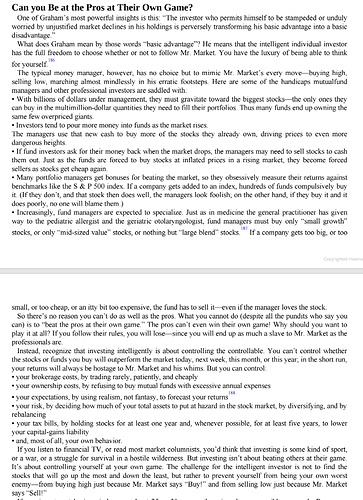Hello everyone,
I wasn’t sure which category to put this in, so I’m leaving it in Uncategorized. Please feel free to move it to a more suitable category, if one exists.
This is a kind of existential question for this site. It’s hard to imagine this question does not exist already, but my searches did not bring up anything. If it does exist, I can close or delete this question - whatever the protocol is here.
On more than one occasion, I’ve been told that, with regarding to investing for myself, I can’t possibly hope to beat the professionals, the experts, the people who do it all the time, and have all the background, training, and resources. The implication (though nobody ever said this in so many words) is that I should give up, not worry my pretty little head about it, and let someone else make the decisions for me.
I expect that if you are on this site, then you are interested in investing for yourself. So the question is, why don’t you find a suitable expert to handle your expenses? I guess they call these financial managers or financial consultants. Or just put your money in a mutual fund or similar, and let the fund manager handle it?
I don’t really have a good answer to my question, personally. But in practice I’ve never met anyone who I would trust with handling my money. Over the course of a lifetime, I’ve had many bad experiences with professionals. Doctors, dentists, lawyers, accountants, academics, many of whom had no idea what they were doing. Some were criminally incompetent. Others were simply criminal. And the few investment professionals I’ve met in India have not inspired me with a spirit of trust.
Don’t get me wrong - I’d love to have someone take care of decisions for me. But for me, this has never worked out well.
But this question is about you. Why do you choose to go it yourself? I suspect this is one question for which many people on this site would have answers. Probably many different ones.

